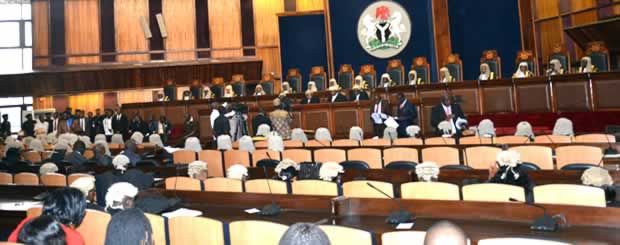Many years ago, Nigeria earned a longstanding place as one of the most corrupt countries in the world. This is because corruption in Nigeria continues to thrive as a consequence of the nexus between bureaucracy, politics and criminality. Because of this, Nigeria is no longer considered a ‘soft state.’ it has now become a ‘consideration state’ where everything can be obtained for a consideration.
Today, the number of judges with an honest image can be counted on one finger. At one time, bribes were being paid for correcting wrongs. These days, bribes are being paid for getting things done at the right time. A corrupt judicial system not only violates the basic right to equality before the law, it also denies the procedural rights guaranteed by the Nigerian constitution to many Nigerian citizens.
The magnitude of the scandals against Justice Dan Ladi Umar, the Chairman of the Code of Conduct Bureau, and the former Chairman of the Economic and Financial Crimes Commission (EFCC), Ibrahim Lamorde, is setting new dimensions in the fight against corruption in Nigeria.
Any trip down memory lane will reveal that under Lamorde, the questionable handling of corruption cases at the EFCC ventured to new lows. The Senate Committee on Ethics, Privileges and Public Petitions investigated Lamorde, a former police officer who headed the Special Fraud Unit (SFU) of the Nigerian Police Force in 1993, over allegations of diverting stolen funds amounting to over N1 trillion. What is even more interesting is that these diverted funds, were allegedly seized from looters of Nigeria’s commonwealth by the EFCC, then diverted to only-god-knows-where. What Nigerians should be asking is: how is it that the people that have been tasked with catching thieves, have become thieves themselves.
Additionally, when you think of a ‘corrupt’ judge, your mind should not wander farther than Justice Danladi Umar. Umar, who investigations have revealed is a former Special Assistant on Legal matters to Governor Nasir El-Rufai. Over the past few months, Justice Umar has demonstrated how incapable he is in the interpretation of the statutes and the Constitution of the Federal Republic of Nigeria. To further demonstrate the level of his incompetency to serve as a judge on one of Nigeria’s most important tribunals, evidence has surfaced that point to Umar using his office as the head of Nigeria’s asset investigation tribunal to milk funds (bribes) from defendants.
To show the level of his alleged complicity in obtaining bribes, the EFCC obtained bank cheques, phone messages, and written statements pointed to Dan Ladi Umar collecting a down payment of N1.8 million through his personal assitant, Abdullahi Gambo. This payment was said to have been a precursor to a larger agreed-upon settlement of N10 millon.
As revealed by EFCC documents, the aim of the bribe was to quash a case against one Mr. Taiwo. After Mr. Taiwo had made the initial deposit of N1.8 Dan Ladi began to demand the remaining N8.2 million. When Taiwo was unable to meet up with the payments, he filed a petition with the EFCC against Dan Ladi Umar.
The EFCC then moved in on Justice Umar. In his written statement at the EFCC, Umar revealed that he had in fact met Mr. Taiwo in his office (privately), but denied that he had received nor demanded N10m or N1.8m. Dan Ladi’s personal assitant however, in his own written statement mentioned that he owned the Zenith bank account that the money was deposited into and said that Mr. Taiwo deposited the money on 12/12/12, and he had withdrawn it and given it to Dan Ladi Umar on the same day “hand to hand.”
What makes the allegations even more damning is that the EFCC also confirmed that the phone number used in sending Dan Ladi Umar’s bank account number to Mr. Taiwo belonged to none other than Dan Ladi Umar himself. However, when asked to produce the phone, Dan Ladi Umar said that he had lost the phone – hence the EFCC was unable to conduct forensic testing on the phone. However, the evidence was still substantial.
The renewed anti-corruption fight, Nigerians should not turn a blind eye to such allegations. Although Justice Umar is currently the head of the CCT, there should be a thorough investigation into his activities – especially as it relates to this bribery allegation. For us to look away, in these times of change, would amount to making a man with alleged unclean hands, a referee in a game where clean hands are needed to adjudicate justly, and fairly.




 Premier League
Premier League